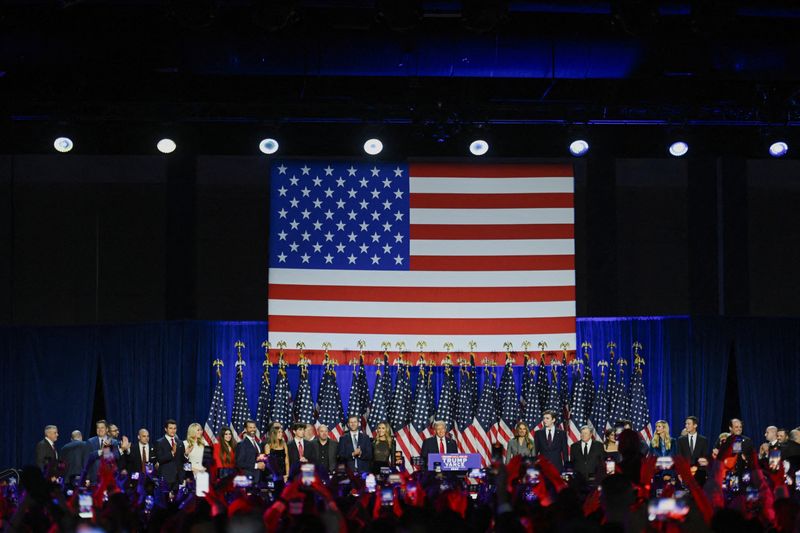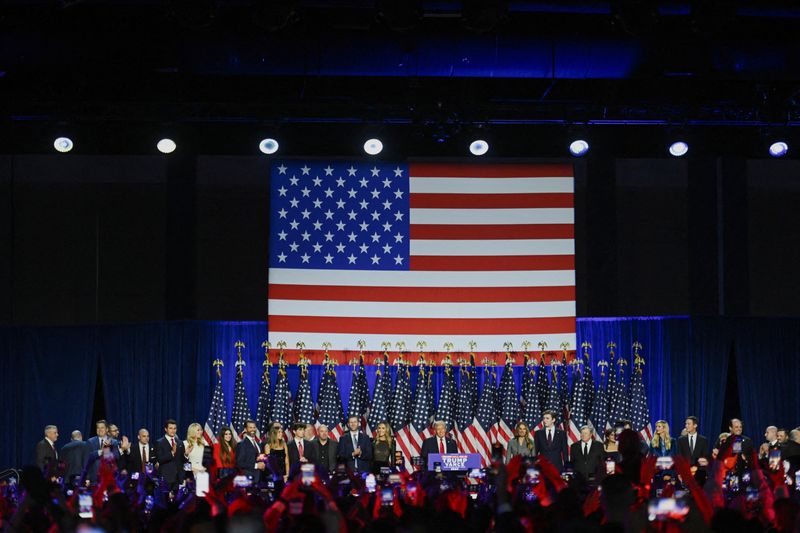Stock Markets
Factbox-What Trump 2.0 could mean for trade, migrants, climate change and electric cars

By James Oliphant
WASHINGTON (Reuters) -Donald Trump’s second presidential term could have huge implications for U.S. trade policy, climate change, the war in Ukraine, electric vehicles, Americans’ taxes and illegal immigration.
While some of his campaign proposals would require congressional approval, here is a summary of the policies he has said he will pursue when he takes office in January:
MORE TARIFFS
Trump has floated the idea of a 10% or more tariff on all goods imported into the U.S., a move he says would eliminate the trade deficit. But critics say it would lead to higher prices for American consumers and global economic instability.
He has also said he should have the authority to set higher tariffs on countries that have put tariffs on U.S. imports. He has threatened to impose a 200% tariff on some imported cars, saying he is determined in particular to keep cars from Mexico from coming into the country.
But he has also suggested that allies such as the European Union could see higher duties on their goods.
Trump has targeted China in particular. He proposes phasing out Chinese imports of goods such as electronics, steel and pharmaceuticals over four years. He seeks to prohibit Chinese companies from owning U.S. real estate and infrastructure in the energy and tech sectors.
Trump has said “tariff” is his favorite word and views them as revenue generators that would help fill government coffers.
MASS DEPORTATIONS
Trump has vowed to reinstate his first-term policies targeting illegal border crossings and to forge ahead with sweeping new restrictions.
He has pledged to limit access to asylum at the U.S.-Mexico border and to embark on the biggest deportation effort in American history, which would likely trigger legal challenges and opposition from Democrats in Congress.
He has said he will employ the National Guard, and, if necessary, federal troops, to achieve his objective, and he has not ruled out setting up internment camps to process people for deportation.
Trump has said he would seek to end automatic citizenship for children born to immigrants, a move that would run against the long-running interpretation of the U.S. Constitution’s 14th Amendment.
He has also suggested he would revoke protected legal status for some populations such as Haitians or Venezuelans.
Trump says he will reinstitute the so-called “travel ban” that restricts entry into the United States of people from a list of largely Muslim-dominant countries, which sparked multiple legal battles during his first term.
Some of Trump’s earliest appointments reflected an urgency to follow through on his immigration agenda. Trump has named a “border czar,” Tom Homan, and will make Stephen Miller, the architect of his immigration plans, a White House deputy chief of staff.
DRILLING AWAY
Trump has vowed to increase U.S. production of fossil fuels by easing the permitting process for drilling on federal land and would encourage new pipelines. He has said he would reauthorize oil drilling in the Arctic National Wildlife Refuge in Alaska.
Trump has pledged to create a National Energy Council to coordinate policies to boost U.S. energy production that will be led by his pick for interior secretary, North Dakota Governor Doug Burgum.
Whether the oil industry follows through and raises production at a time when oil and gas prices are relatively low remains to be seen.
Trump has said he will again pull the United States out of the Paris Climate Accords, a framework for reducing global greenhouse gas emissions, and would support increased nuclear energy production.
He would also roll back Democratic President Joe Biden’s electric-vehicle mandates and other policies aimed at reducing auto emissions.
He has argued that the U.S. needs to be able to boost energy production to be competitive in developing artificial intelligence systems, which consume large amounts of power.
TAX RELIEF
Along with his trade and energy agendas, Trump has promised to slash federal regulations that he says limit job creation. He has pledged to keep in place a broad 2017 tax cut that he signed while in office, and his economic team has discussed a further round of individual and corporate tax cuts beyond those enacted in his first term.
Trump has pledged to reduce the corporate tax rate from 21% to 15% for companies that make their products in the U.S.
He has said he would seek legislation to end the taxation of tips and overtime wages to aid waiters and other service workers. He has pledged not to tax or cut Social Security benefits.
Trump also has said that as president he would pressure the Federal Reserve to lower interest rates – but would stop short of demanding it.
Most, if not all, of his tax proposals would require congressional action. Budget analysts have warned that the bevy of tax cuts would balloon the federal debt.
DOING AWAY WITH DIVERSITY PROGRAMS
Trump has pledged to require U.S. colleges and universities to “defend American tradition and Western civilization” and to purge them of diversity programs. He said he would direct the Justice Department to pursue civil rights cases against schools that engage in racial discrimination.
At K-12 schools, Trump would support programs allowing parents to use public funds for private or religious instruction.
Trump also wants to abolish the federal Department of Education, and leave states in control of schooling.
NO FEDERAL ABORTION BAN
Trump appointed three justices to the U.S. Supreme Court who were part of the majority that did away with Roe v. Wade’s constitutional protection for abortion. He likely would continue to appoint federal judges who would uphold abortion limits.
At the same time, he has said a federal abortion ban is unnecessary and that the issue should be resolved at the state level. He has argued that a six-week ban favored by some Republicans is overly harsh and that any legislation should include exceptions for rape, incest and the health of the mother.
Trump has suggested he would not seek to limit access to the abortion drug mifepristone after the U.S. Supreme Court rejected a challenge to the government’s approach to regulating it.
He supports policies that advance in vitro fertilization (IVF), birth control and prenatal care.
A PUSH TO END WARS
Trump has been critical of U.S. support for Ukraine in its war with Russia, and has said he could end the war in 24 hours if elected – although he has not said how he would achieve this.
He has suggested Ukraine may have to yield some of its territory if a peace deal is to be struck, an idea Ukraine has consistently rejected.
Trump’s pick for his national security adviser, U.S. Representative Michael Waltz, was critical of the Biden administration’s decision in November to allow Ukraine to use U.S.-provided missiles to strike within Russian territory.
Trump has also said that under his presidency the U.S. would fundamentally rethink “NATO’s purpose and NATO’s mission.”
Trump named U.S. Senator Marco Rubio, a China hawk, as his secretary of state, charged with carrying out his foreign policy goals.
Trump has backed Israel in its fight against Hamas in Gaza but has urged it to wrap up its offensive. He can be expected to continue the Biden administration’s policy of arming Israel. At the same time, Trump is likely to push for historic normalization of relations between Israel and Saudi Arabia, an effort he made during his 2017-2021 presidency and which Biden has also pursued.
Trump has said if he becomes president, he will “stop the suffering and destruction in Lebanon,” but has not said how he will achieve that.
He has suggested building an “iron dome” – a massive missile-defense shield similar to Israel’s – over the entire continental United States.
Trump has also floated sending armed forces into Mexico to battle drug cartels and using the U.S. Navy to form a blockade of that country to stop the smuggling of fentanyl and its precursors.
His transition team has been drawing up lists of potential high-ranking U.S. military officers to fire as part of a purge of the Pentagon of those believed to be “disloyal” to Trump.
INVESTIGATING ENEMIES, AIDING ALLIES
Trump has pledged at times to use federal law enforcement agencies to investigate his political foes, including election officials, lawyers and party donors.
Trump tapped former U.S. congressman Matt Gaetz as his attorney general. Gaetz has suggested he is sympathetic to Trump’s revenge agenda.
Along that line, Trump has said he will consider appointing a special prosecutor to probe Biden, though he has not specified the grounds for such an investigation.
And he has said he would consider firing a U.S. attorney who did not follow his directives – which would constitute a break with the longstanding U.S. policy of an independent federal law enforcement apparatus.
Trump has said he will consider pardoning all of those who have been convicted of crimes in connection with the Jan. 6, 2021, attack on the U.S. Capitol.
In addition to criminal investigations, he has suggested using the government’s regulatory powers to punish those he views as critics, such as television networks.
PURGING THE FEDERAL BUREAUCRACY
Trump would seek to decimate what he terms the “deep state” – career federal employees he says are clandestinely pursuing their own agendas – through an executive order that would reclassify thousands of workers to enable them to be fired. That would likely be challenged in court.

He has said he will set up an independent government efficiency panel headed by billionaire supporter Elon Musk and former presidential candidate Vivek Ramaswamy to root out waste in the federal government. The government already has watchdogs such as the Office of Management and Budget, and investigators general at federal agencies.
Trump would crack down on federal whistleblowers, who are typically shielded by law, and would institute an independent body to “monitor” U.S. intelligence agencies.
Stock Markets
Suburban Propane director Logan sells $139k in shares
Stock Markets
Stock market today: S&P 500 closes lower, but posts big weekly win
Stock Markets
TD Bank promotes Laura Nitti to retail market president role

 Forex3 years ago
Forex3 years agoForex Today: the dollar is gaining strength amid gloomy sentiment at the start of the Fed’s week

 Forex3 years ago
Forex3 years agoUnbiased review of Pocket Option broker

 Forex3 years ago
Forex3 years agoDollar to pound sterling exchange rate today: Pound plummeted to its lowest since 1985

 Forex3 years ago
Forex3 years agoHow is the Australian dollar doing today?

 Cryptocurrency3 years ago
Cryptocurrency3 years agoWhat happened in the crypto market – current events today

 World3 years ago
World3 years agoWhy are modern video games an art form?

 Commodities3 years ago
Commodities3 years agoCopper continues to fall in price on expectations of lower demand in China

 Economy3 years ago
Economy3 years agoCrude oil tankers double in price due to EU anti-Russian sanctions





















